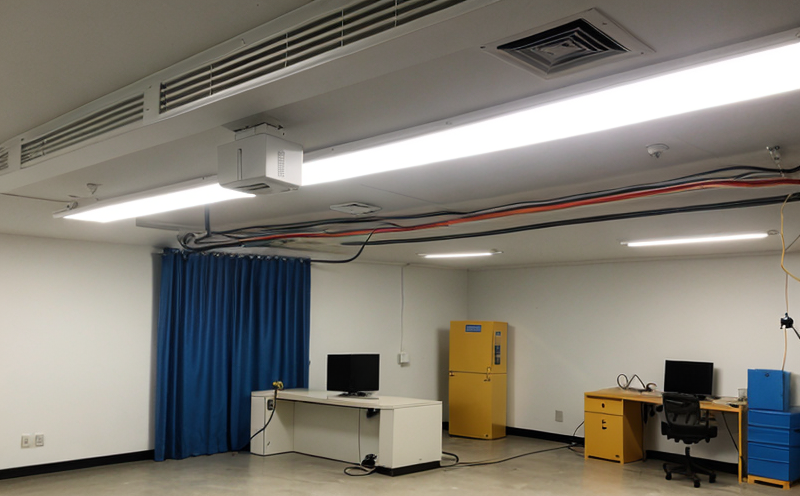EN 62384 Electronic Control Gear for LED Modules
The European Standard EN 62384 defines the performance requirements and test methods for electronic control gear (ECL) used in lighting systems with LEDs. This standard is essential for ensuring the quality, safety, and efficiency of electronic control gears designed to operate light-emitting diodes effectively.
Electronic control gear plays a critical role in LED lighting by regulating the flow of current through the LED modules, which helps in optimizing energy consumption, extending the lifespan of LEDs, and enhancing overall system performance. Compliance with EN 62384 is mandatory for manufacturers aiming to meet regulatory requirements and ensure product reliability.
The standard covers a range of parameters that are crucial for the proper functioning of LED lighting systems. These include efficiency, power factor correction, harmonic distortion, flicker, and more. The tests prescribed by this standard help in evaluating whether these parameters fall within acceptable limits set forth by international standards and regulatory bodies.
EN 62384 is particularly relevant for manufacturers who supply to the building & infrastructure sector, where energy efficiency and sustainability are key considerations. By adhering to this standard, companies can ensure that their products not only meet but exceed market expectations in terms of performance and compliance.
In summary, EN 62384 electronic control gear is a vital component of LED lighting systems used in various applications within the building & infrastructure sector. Its compliance ensures safety, efficiency, and reliability of these systems, contributing to sustainable development goals.
Why It Matters
The importance of EN 62384 cannot be overstated given its role in ensuring the quality and safety of LED lighting systems. By adhering to this standard, manufacturers can guarantee that their products meet stringent international criteria, thereby enhancing customer trust and satisfaction.
Compliance with EN 62384 also facilitates easier market entry into countries or regions where these standards are enforced. This is particularly beneficial for businesses looking to expand internationally while maintaining consistent product quality across different markets.
Furthermore, compliance helps in reducing the risk of recalls and potential legal issues associated with non-conformity products. It also supports continuous improvement initiatives by providing clear benchmarks against which performance can be measured over time.
From a broader societal perspective, adherence to such standards promotes energy efficiency and sustainability goals by encouraging the use of more efficient lighting solutions. This contributes positively towards reducing carbon footprints and promoting environmental responsibility among consumers.
Scope and Methodology
| Test Parameter | Description |
|---|---|
| Efficiency | The ratio of useful electrical power output to input, measured under specified conditions. |
| Power Factor Correction (PFC) | An indication of how much of the apparent power is actually used for doing work; typically expressed as a percentage between 0% and 100%. |
| Harmful Harmonics | Distortion in the waveform that can cause interference or damage to other equipment connected to the same supply line. |
| Flicker | The periodic variation in light intensity, which could affect visual comfort and performance for people using LED lighting. |
| Thermal Stress | Evaluation of how well the electronic control gear can withstand heat generated during normal operation without degrading its performance or lifespan. |
| Voltage Range | The range over which the ECL must operate correctly, ensuring stable performance regardless of fluctuations in mains voltage. |
| Response Time | The time taken by the control gear to react to changes in load, influencing how quickly it adjusts current flow through LEDs for optimal operation. |
The scope and methodology outlined in EN 62384 provide a comprehensive framework for testing and certifying electronic control gears used in LED lighting systems. This ensures that only those products meeting all specified criteria can be considered compliant with the standard.
Eurolab Advantages
At Eurolab, we specialize in providing top-tier testing services tailored specifically to meet the stringent requirements of EN 62384. Our state-of-the-art facilities equipped with advanced instrumentation allow us to conduct thorough evaluations under controlled environments that mimic real-world conditions.
We employ highly skilled professionals who possess deep knowledge and expertise in both theoretical understanding and practical application of relevant standards like EN 62384. This enables accurate interpretation of test results and reliable certification processes.
Our commitment to excellence extends beyond just compliance; we also offer valuable insights into potential improvements that could enhance product performance even further while still adhering strictly to regulatory guidelines.
In addition, our flexible approach allows us to accommodate diverse client needs ranging from small-scale prototypes to large production batches. Whether you're a start-up seeking validation for new designs or an established firm requiring periodic audits, Eurolab stands ready to assist every step of the way.





